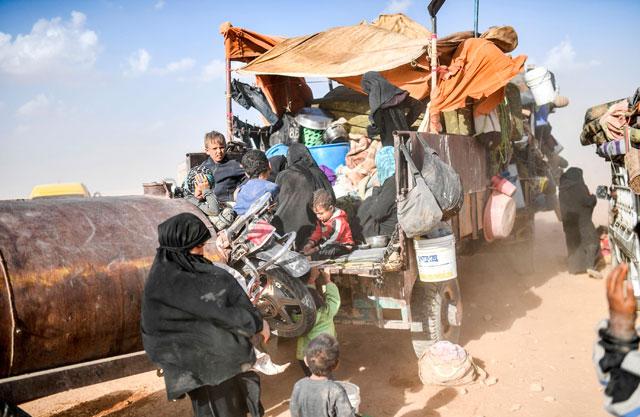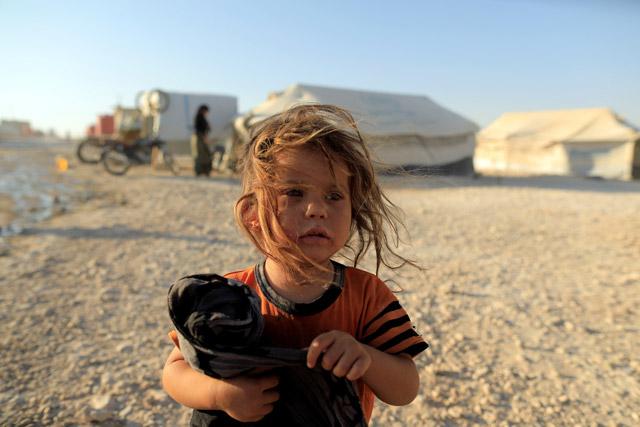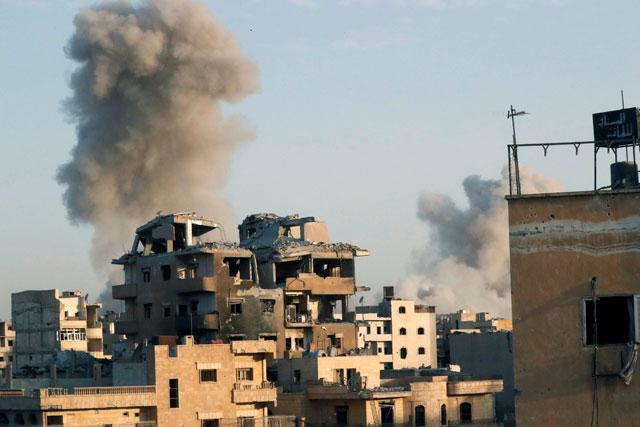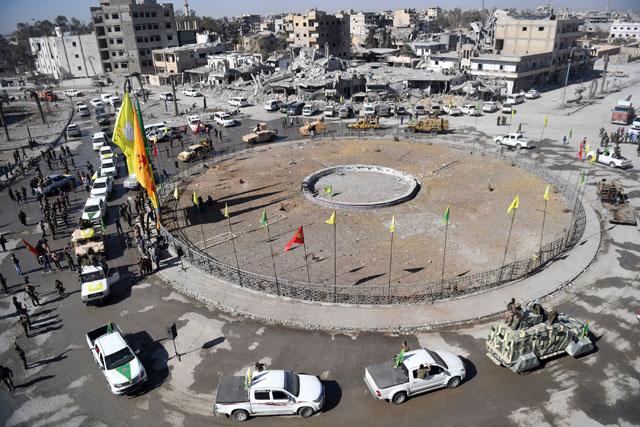You are here
Daesh hostages, strongholds stand between US-backed forces and Raqqa’s capture
By Reuters - Oct 03,2017 - Last updated at Oct 03,2017

Syrians displaced from the city of Deir Ezzor prepare to leave the area where they are gathering to another location on the outskirts of Raqqa on Monday (AFP photo)
RAQQA, Syria — Raqqa’s hospital, a big complex pocked with bullets holes, whose capture will signal the end of the Daesh terror group’s crumbling Syrian capital, lies just 200 yards from a front-line base of the Syrian Democratic Forces.
Beyond it, a roundabout where the extremists once displayed the heads of their enemies, crucified people and held military parades at the height of their expansion is another strategic prize sought by the US-backed militia alliance.
Commanders directing the battle on the ground say seizing these and a nearby stadium, Daesh’s last strongholds in the city, could take as little as a week once a final assault begins against just a few hundred remaining militants.
But the ultra-hardline group is holding civilian hostages in the hospital and stadium and using sniper fire, booby traps and tunnels that emerge behind SDF lines to slow the battle.
The SDF faces a tough final showdown with Daesh which commanders say will end at the hospital, now almost completely surrounded.
“There are many civilians being held. We can’t use heavy weaponry or air strikes around the hospital or stadium, so we’ll encircle them as we advance,” commander Haval Gabar said at the front-line base, a home that SDF units captured last week.
“The hospital will be the last point [in Raqqa] to be freed,” he said on Saturday, as bullets coming from the sprawling medical complex whizzed over the base.
The SDF, an alliance of Kurdish and Arab militias dominated by the Kurdish YPG, has been fighting since June to drive Daesh from Raqqa city, backed by air strikes and special forces from a US-led coalition.
‘There’s no advancing’
The assault, which YPG officials initially predicted would take weeks, has dragged on as Daesh bogs down forces with tactics used in other bastions such as Iraq’s Mosul. Senior Kurdish commanders recently said Raqqa would fall by the end of October.
“Right now there’s no advancing,” Gabar, 25, said.
“There have been many attacks from behind us” with militants launching surprise raids from a network of tunnels they dug after marauding through swathes of Syria and Iraq and capturing Raqqa in 2014, he said.
“When that happens we divert forces from front-line assaults to deal with the infiltration. But it doesn’t take long, maybe half an hour to deal with each attack.”
The home the SDF was using as a base had a Daesh tunnel emerging into its living room — now blocked up with furniture.
Commander Zilzal Tarhams said militants emerged from a second nearby tunnel two days before and fired a rocket into a house occupied by the SDF.
“If we find tunnels we usually cave them in with explosives. There are so many,” he said.
The commanders were confident of total victory soon, however, with Daesh surrounded in a small portion of the city which houses the remaining strategic sites.
Gabar, who directs fighting on the western front, said forces were waiting for the order for a final push, after which the roundabout, stadium and hospital would quickly fall.
“When we begin it will be quick, maybe 10 days or so,” he said. Tarhams predicted a week.
“It’s really because of the civilians presence that it’s taking us some time,” Gabar said. There were thousands of residents still trapped in the city, including an unknown number at the stadium and hospital, he said.
Capture before winter
Air strikes that have been used heavily in other parts of the city are not as frequent around the remaining sites, although missiles still slam into buildings in the city centre.
Gabar and Tarhams did not say how the SDF planned to capture the stadium and hospital, both of which provide high vantage points over the city centre, while avoiding the deaths of residents held there.
Daesh leader Abu Bakr Al Baghdadi commanded his militants not to negotiate or surrender in an audio message released recently.
Raqqa’s complete capture will end the group’s sway in the city from where it plotted deadly attacks abroad, and projected its power in 2014 parading through streets flying black flags on military vehicles.
The two SDF commanders estimated there were no more than 350 militants left in Raqqa and said these were not the elite of the group. Many leaders are believed to have fled to Deir Ezzor where the SDF and Syrian government forces are pressing competing offensives against Daesh.
Other tactics the fighters were using to slow SDF advances include laying booby traps, Tarhams said. “They put mines under rugs in homes and use motion sensors to set off bombs. It’s a huge obstacle.”
Battle weary, the commanders were keen to capture the last strategic sites as soon as possible.
“We want to finish before winter — bad weather makes it harder to advance,” Gabar said.
“We’ll need months to fully clear the explosives afterwards — that’s going to be an even bigger job.”
Related Articles
RAQQA, Syria — US-backed forces now have the Daesh terror group militants surrounded in central Raqqa, a Syrian Kurdish commander said, but
AIN ISSA, Syria — US-backed fighters say they are nearing the “final week” of their assault to drive the Daesh terror group from its one-tim
RAQQA, Syria — US-backed forces who captured Raqqa from the Daesh extremist group prepared Thursday to hand the Syrian city over to a civili














